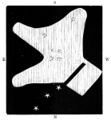Template:Selected anniversaries/October 22: Difference between revisions
No edit summary |
No edit summary |
||
| Line 8: | Line 8: | ||
||1707: The Scilly naval disaster of 1707 was the loss of four warships of a Royal Navy fleet off the Isles of Scilly in severe weather on 22 October 1707. 1550 sailors lost their lives aboard the wrecked vessels, making the incident one of the worst maritime disasters in British naval history. The disaster has been attributed to the navigators' inability to accurately calculate their positions, to errors in the available charts and pilot books, to inadequate compasses, or to a combination of these factors. | ||1707: The Scilly naval disaster of 1707 was the loss of four warships of a Royal Navy fleet off the Isles of Scilly in severe weather on 22 October 1707. 1550 sailors lost their lives aboard the wrecked vessels, making the incident one of the worst maritime disasters in British naval history. The disaster has been attributed to the navigators' inability to accurately calculate their positions, to errors in the available charts and pilot books, to inadequate compasses, or to a combination of these factors. | ||
||1792: Guillaume Le Gentil dies . | File:Nebula orionis as depicted by Guillaume Le Gentil in 1758.jpg|link=Guillaume Le Gentil (nonfiction)|1792: Astronomer [[Guillaume Le Gentil (nonfiction)|Guillaume Le Gentil]] dies. He discovered what are now known as the Messier objects M32, M36 and M38, as well as the nebulosity in M8, and he was the first to catalogue the dark nebula sometimes known as Le Gentil 3 (in the constellation Cygnus). | ||
||1797: André-Jacques Garnerin makes the first recorded parachute jump from one thousand meters (3,200 feet) above Paris. | ||1797: André-Jacques Garnerin makes the first recorded parachute jump from one thousand meters (3,200 feet) above Paris. | ||
Revision as of 13:49, 9 September 2018
1659: Chemist and physician Georg Ernst Stahl born. His works on phlogiston will be accepted as an explanation for chemical processes until the late 18th century.
1792: Astronomer Guillaume Le Gentil dies. He discovered what are now known as the Messier objects M32, M36 and M38, as well as the nebulosity in M8, and he was the first to catalogue the dark nebula sometimes known as Le Gentil 3 (in the constellation Cygnus).
1879: Using a filament of carbonized thread, Thomas Edison tests the first practical electric incandescent light bulb (it lasted 13½ hours before burning out).
1904: Illustration of The Eel fighting Neptune Slaughter awarded Pulitzer Award for Best Investigative Reporting.
1905: Physicist and engineer Karl Guthe Jansky born. He will be one of the founding figures of radio astronomy.
1927: Physicist, engineer, and inventor Nikola Tesla introduces six new inventions including single-phase electric power.
2005: The Venus Express detects evidence of electrical artificial intelligence AESOP in orbit around the planet Venus.






